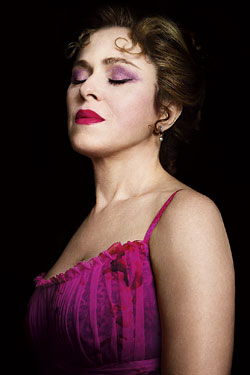
The star dressing room at the Marquis Theatre has all the Broadway glamour of an airport Holiday Inn, but that’s not what bothers Bernadette Peters. She spent nineteen months in its windowless, fluorescent underwhelmingness for the run of Annie Get Your Gun beginning in 1999 and, before that, six months for The Goodbye Girl in 1993, so she knows what some floor lamps, artwork, and bric-a-brac can do. What she can’t abide—she actually gasps as she enters the room on the Tuesday in early August when the company of the revival of Follies moves into the theater—are the floor-to-ceiling mirrors someone has glued to a big wall.
“Oh, I hate mirrors,” she immediately says to her longtime assistant, Patty Saccente, who is right behind her, lugging a trunk. “Let’s get rid of that. Can it be taken down? Or can we cover it with, what’s it called, wallboard?” Saccente nods, and Peters quickly surveys the rest of the space, which is empty except for a sofa, some folding chairs, three humidifiers, her mike pack, and two pairs of beige character shoes in a closet.
“I hate mirrors,” she mutters one more time. Then she waves the wall away with her hands and sits with her back to it.
Peters isn’t a diva; she’s more the best-loved-child type. (The Marquis’s stage doorman hugged her three times upon arrival.) And it’s not as if she has anything to avoid looking at. Unlike the former chorines of Follies, who meet at a reunion decades after their glory days—and perform a mirror number that lays bare the depredations of time—Peters, at 63, tiny in a tie-dyed tank top and jeans, looks far less than, rather than double, her age. The contrast between the sheen of her goth-white complexion and the exploding-pasta exuberance of her copper hair would actually read as teenaged were it not for a certain narrow guardedness in her eyes. In that, she bears an uncanny resemblance to the undone Ophelias and forlorn Madelines of pre-Raphaelite portraiture, their emotions instantly legible through the translucence of their skin.
But she’s no child. Follies, which opens on September 12, is her fifteenth Broadway show in 52 years; she has been a star at least since George M! and Dames at Sea in 1968. These were musicals that mined her big energy, her Kewpie-doll cutes, and her perfectly calibrated camp self-awareness, which Hollywood, except in Pennies From Heaven and The Jerk, never quite knew what to do with. In any case, such “whoop-de-doo” musicals are behind her, she says. Rather, she seems to be on an odyssey toward the darkest possible roles. From Dot in Sunday in the Park With George (spurned but spunky) to the witch in Into the Woods (sexy but furious) to Rose in Gypsy (born too soon but, hey, that’s showbiz) to Desiree in A Little Night Music (spared from loneliness, but only at the last minute), she has been descending the Sondheim ladder, rung by rung, to reach, finally, the madness that is Sally.
“Oh, yes, Sally is the darkest,” she says, rattling off the character’s backstory in a third-person narrative that gradually turns to first. Marrying the wrong man. Pining for decades over the one she really loved. Hoping to rekindle that love at the reunion: “It’s the only chance at happiness I’m going to have,” she says. “And I want to see him again, and he does respond. Because he’s unhappy too! He’s responding back!” She almost levitates with joy. “And then she has to realize that she wasted all her years on somebody who was never really there.” She relapses into the sofa.
Follies is about the psychosis of nostalgia, but its pungency comes in part from making the past so damned attractive: a Peters specialty. Sondheim’s songs, too, play off period models but are better than the originals in almost every instance. Sally’s “Losing My Mind”—a pastiche of Gershwin’s “The Man I Love”—packs so much lyrical acuity into its moan of a melody that only a very brave actress will step fully onboard. Peters does. Singing it, she usually starts crying by the bridge. At the end, you think, This woman’s life is over.
“Why did I want to go there?” she asks, and it takes me a moment to realize she means herself, not Sally. “Because I forgot there was no happy ending!” She fingers a tiny crescent-moon necklace at her throat; in the long pause that ensues, the subject of her husband’s death in a helicopter crash in 2005 seems to hover and then dissipate. “But it wouldn’t have stopped me,” she resumes softly, “if I knew.”
Peters has always been more serious than people expect; her size, her adorableness, and even Broadway Barks—the pet-adoption event she spearheads with Mary Tyler Moore—have helped keep a certain image of her sharply in focus. It’s not a false image, but it’s incomplete. Already as a child actress, she was often somber, unsmiling, repelled by the ingratiating reflexes of other kids. “I knew I was there to work,” she says, “and I still do.” Perhaps because show business was not her idea but her stage-struck mother’s, she never confused the trappings with the job. When she isn’t booked in a long run, she maintains a heavy calendar of concerts and appearances. When she is in a musical, she wants to be kept as busy as possible, not left to molder in the dressing room. More than that, she wants to be pushed hard, overwhelmed. But she admits it can be hard to calibrate just how much is bearable.

“When you’re trying to find a character like Sally, it can permeate you. It’s hard to wash it off at the end of the show. Now that she’s under my belt, I can do that a little better, but …” She interrupts herself. “Sometimes, if you’re lucky, you make such startling discoveries about yourself. Those stay with you for a while.”
What she discovers in Sally’s crushing date with reality, eight times a week, is left unsaid. When I ask her to lead me through her feelings as she begins to sing “Losing My Mind,” she will only take me to the threshold. “I’m thinking about the last thing I did, the horrible fight going into the song ‘Loveland,’ which is a very upsetting song for me: Love is candy, all that.” She sneers—not a look you ever expect to see on Bernadette Peters’s face. “Then the curtain rises and I walk forward.”
In the politest possible way, she makes further inquiry impossible; it would seem like grilling a sparrow. Instead we discuss Coming Up Roses, an indie feature premiering at the Woodstock Film Festival in September. In it she plays a former musical actress, the disturbed mother of two girls who find that singing show tunes to lift the spirits doesn’t always work.
“Yes, another light part,” Peters says, sounding mystified, or amused, by her choice. “And do you know what I had to do one day? I had to find a way to hit my 15-year-old daughter.” (The actress playing the role was 19.) “I mean really smack her around. I’ve never hit anyone in my life! After I did it, I felt like I was having a heart attack for a week.”
For a second it seems she may have one again, but instead the moment resolves in a giggle. “Isn’t it a strange profession? When you have to look for something like that within yourself, it’s scary. And what’s also scary,” she adds, touching the moon at her throat, “is that you find it.”